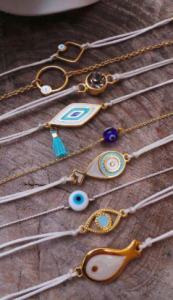Title: Evil Eye Prevention
General Information about Item:
- Genre and Sub Genre: Customary Folklore– Superstition
- Country where Item is from: Greece
Informant Data:
Three different informants provided us with this same piece of folklore:
-
- Judith Varlamos is from Seattle, WA. Her mom is from Karpenisi in Central Greece, and she still has relatives who live in Greece. Her husband also speaks fluent Greek, and they follow many Greek customs. They are also practicing Greek Orthodox Christians. They own a Greek pizza place in the neighborhood.
- Mary Wallenmeyer is a 55 year-old woman from Shermans Dale, PA. Both of her parents, her two sisters, and her one brother were born in Greece. Her parents were raised in a small village in the mountains of central Greece. Her father came to the U.S. first and worked for two years so he could bring the rest of the family to America. She was born a year after her parents were reunited in the U.S., and her younger brother was born seven years later. Her father and his siblings are deceased, but she still have cousins from his side of the family that live in Greece. Her mother has six siblings still living in Greece along with their families. Growing up, Mary and her family spoke Greek at home and attended Greek classes. Her husband and children do not speak the language fluently, but they do understand some of it. Her family belongs to the Greek Orthodox church, which she says “ helps keep the ‘Greek’ alive in [their] lives.” Their family still prays in Greek and cooks many Greek foods. They are very proud of their Greek heritage.
- Lia Constantine is a ’21 Dartmouth student from Fredericksburg, Virginia. Her Greek heritage is very much part of her identity. She relates to the family in the movie, “My Big Fat Greek Wedding” in a lot of ways. It is also something she has grown up with and that her parents and grandparents are very proud of, so she has inherited that pride. Both her parents are 100% Greek. They were both born in the U.S., but her dad lived in Greece for a period of time.
Contextual Data:
- Social Context: These charms are worn by many Greek people to prevent the Evil Eye. Such charms are commonly given as gifts to family members, especially to newborn babies.
- Cultural Context: The Evil Eye is recognized by the church as a legitimate religious phenomena. It is believed that evil is generated by the devil. This belief serves as an explanation for bad things that occur, especially illnesses or pain. Special jewelry/ charms serve as an apotropaic (method of turning away evil).
Item:
- The superstition is that If you wear a special charm (“philacto”), you will be protected from the Evil Eye. This is an example of a magic superstition (If you do A, then B).
Associated file (a video, audio, or image file):
Segment of Interview with Lia Constantine

Charms worn to prevent the Evil Eye
Transcript of Associated File:
Transcript of video:
-
- Lia: My mom is superstitious about the Evil Eye so she always gets us little Evil Eye things or puts it in her car and stuff like that so I guess I don’t really believe that but they do…
Informant’s Comments:
Collector’s Comments:
- Lia was interviewed in person (as seen in the video). Mary and Judith were interviewed over FaceTime, as they do not live nearby.
Collector’s Name: Interviews conducted by Jess Valvano (Lia), Katie Spanos (Mary), and Ellen Pattinson (Judith). Webpage published by Carmen Braceras.
Tags/Keywords:
- Evil Eye, Customary Folklore, Greek Superstitions, Charms, Jewelry, Philacto, Apotropaic

